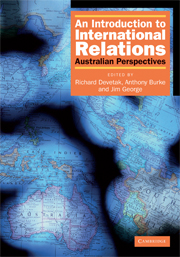Book contents
- Frontmatter
- Contents
- List of tables, figures and boxes
- List of contributors
- Preface and acknowledgments
- An introduction to international relations: the origins and changing agendas of a discipline
- 1 Theory and practice in Australian international relations: the search for identity and security
- Part 1 Theories of international relations
- Part 2 The traditional agenda: states, war and law
- Part 3 The new agenda: globalisation and global governance
- 20 Multilateral economic institutions
- 21 Global trade
- 22 Global finance
- 23 Non-state actors: multinational corporations and international non-governmental organisations
- 24 Global poverty and inequality
- 25 Globalisation and its critics
- 26 The globalisation of Islam
- 27 Global terrorism
- 28 Humanitarianism and armed intervention
- 29 Human rights
- 30 Migration and refugees
- 31 Global environmental politics
- 32 Global governance and the United Nations
- Glossary of terms
- Bibliography
- Index
- References
29 - Human rights
from Part 3 - The new agenda: globalisation and global governance
- Frontmatter
- Contents
- List of tables, figures and boxes
- List of contributors
- Preface and acknowledgments
- An introduction to international relations: the origins and changing agendas of a discipline
- 1 Theory and practice in Australian international relations: the search for identity and security
- Part 1 Theories of international relations
- Part 2 The traditional agenda: states, war and law
- Part 3 The new agenda: globalisation and global governance
- 20 Multilateral economic institutions
- 21 Global trade
- 22 Global finance
- 23 Non-state actors: multinational corporations and international non-governmental organisations
- 24 Global poverty and inequality
- 25 Globalisation and its critics
- 26 The globalisation of Islam
- 27 Global terrorism
- 28 Humanitarianism and armed intervention
- 29 Human rights
- 30 Migration and refugees
- 31 Global environmental politics
- 32 Global governance and the United Nations
- Glossary of terms
- Bibliography
- Index
- References
Summary
Introduction
This chapter examines the rise and growth of human rights. First, it discusses the historical development of human rights. Second, it outlines how human rights are understood today. Third, it explains how the liberal universalism that lies behind human rights has come up against cultural resistance. Fourth and finally, the chapter touches on some challenges that lie ahead in the struggle for human rights.
The doctrine of human rights has become one of the central political doctrines of international politics. This is a remarkable state of affairs, given that only sixty years ago the idea, while championed by some, had little or no traction on the behaviour of states towards one another. The end of World War II was the key marker in the birth of the human rights movement as we know it today. Prior to that war, human rights – or ‘the rights of man’ as they were known – had few political supporters in international relations. The doctrine of realism, or realpolitik, seemed an accurate description of international politics and stood opposed to the kinds of idealism and moralism which the idea of human rights was thought to embody. Importantly too, the idea of universal rights had fallen on hard times in intellectual terms, being subject to various critiques which undermined its authority and persuasive power.
World War II was one of a series of tragedies which gripped the world in the twentieth century.
- Type
- Chapter
- Information
- An Introduction to International RelationsAustralian Perspectives, pp. 340 - 349Publisher: Cambridge University PressPrint publication year: 2007
References
- 1
- Cited by



